WX8525 Heppingstone, Ian David known to all as ‘Pop’ spent the first 12 months on the railway line at Tarsau Hospital camp due to his ill health. Sent to the Burma Thai Railway with ‘D’ Force Thailand S Battalion, Pop missed out of the horror of Hellfire Pass region and Kanyu II, Hintok Camps.
Below: Tarsau 1943-1944
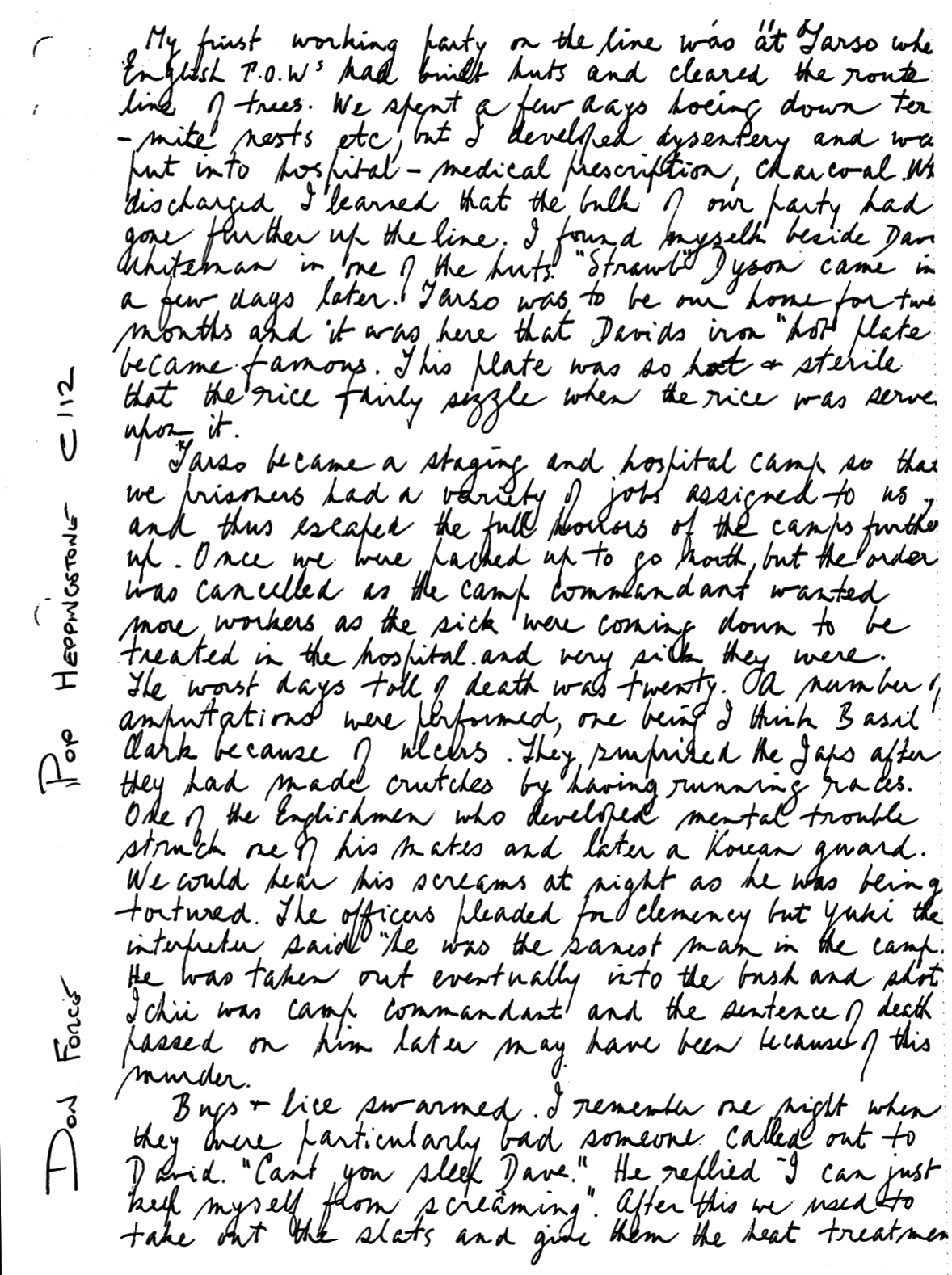
Pop wrote of large numbers of sick and very sick POWs arriving from the ‘Line’ especially during speedo Mid1943 and the terrible days at Tarsau when as many as 20 POWs died in one day. Doctors performed amputations and Heppingstone thought Basil Clarke had his amputation at Tarsau – (in fact Clarke’s amputation took place at Khonkhan Hospital Camp in Burma Sept 1943). POWs constructed crutches – surprising the Japanese with their engenuity.
A British POW was suffering with mental health problems – POWs would hear the man screaming nightly, he was singled out and regularly tortured by the Japanese, until the Japanese took him outside and shot him. Officers had tried to intervene but the Japanese Officer said of the British POW
‘He was the sanest man in the Camp’.
Below: Tamuang – where Pop would have caught up with a large number of 2/4th ‘D’ Force S Battalion – well those who had survived without evacuation with illnesses – and where the Japanese selected ‘fit’ POWs to work in Japan. He was grateful not to be selected – POWs knew the stories of US submarines attacking transport ships on their journey to Japan.
They received improved food rations than previously (The Japanese had to fatten up POWs to sail to Japan) – the Japanese distributed US Food Parcels – most unusual.
Heppingston was sent to Chungkai and work party to Konkoita August 1944 near the border with Burma. At Konkoita they had to repair roads and the railway destroyed by monsoon rains. Konkoita during the businest days on the line gained the notoriety of being the ‘worst POW Camp’ (‘F’ Force).
Officers discovered a large cemetery and several empty huts which had previously been a brothel for the Japanese. The Korean women working in the brothel would have been taken from their families and homes – later known as ‘Comfort’ Women and today (2022) continue to wait for official Japanese acknowledgement, reparation and an official apology.
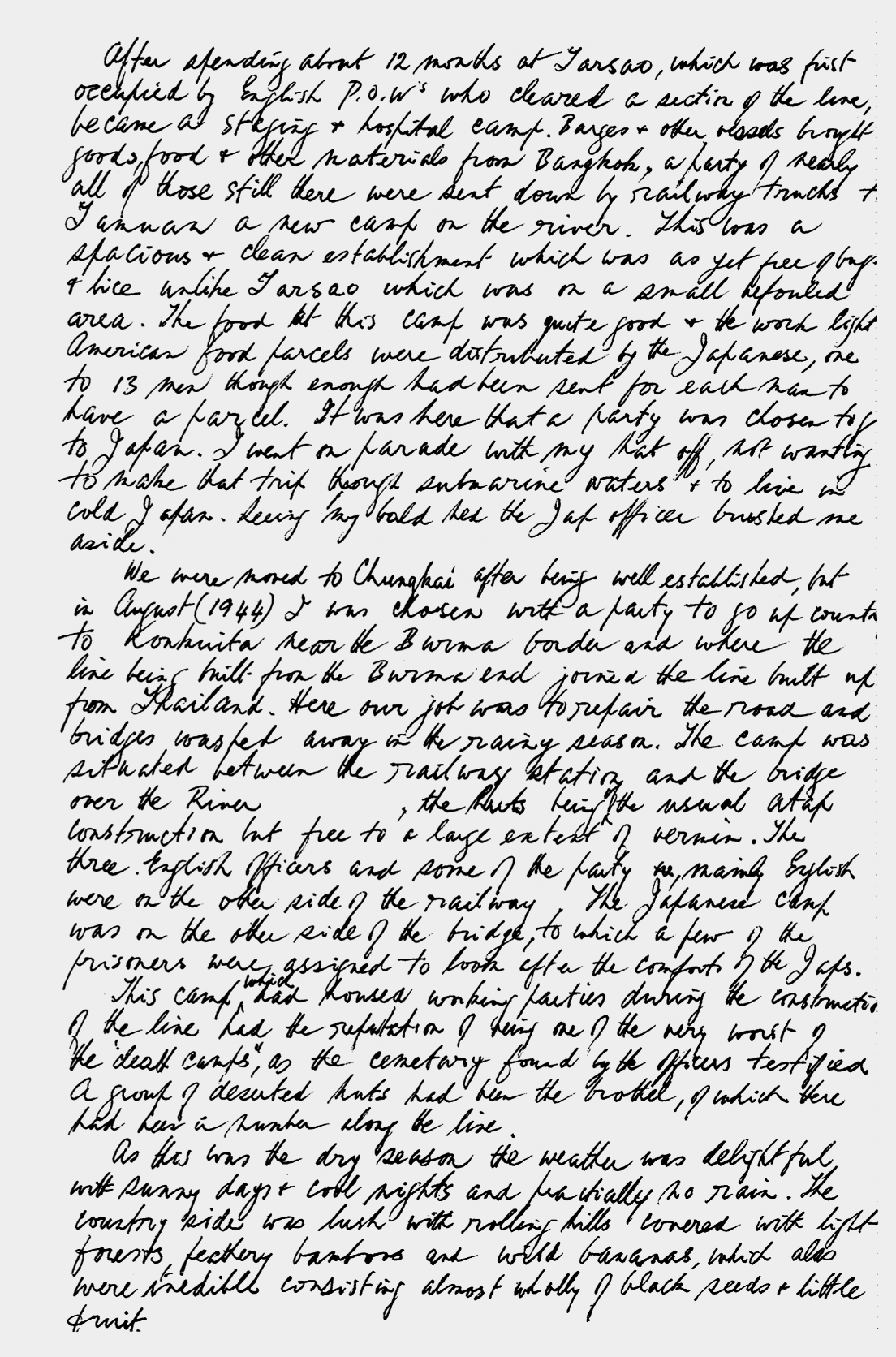
Below: Chungkai 1944
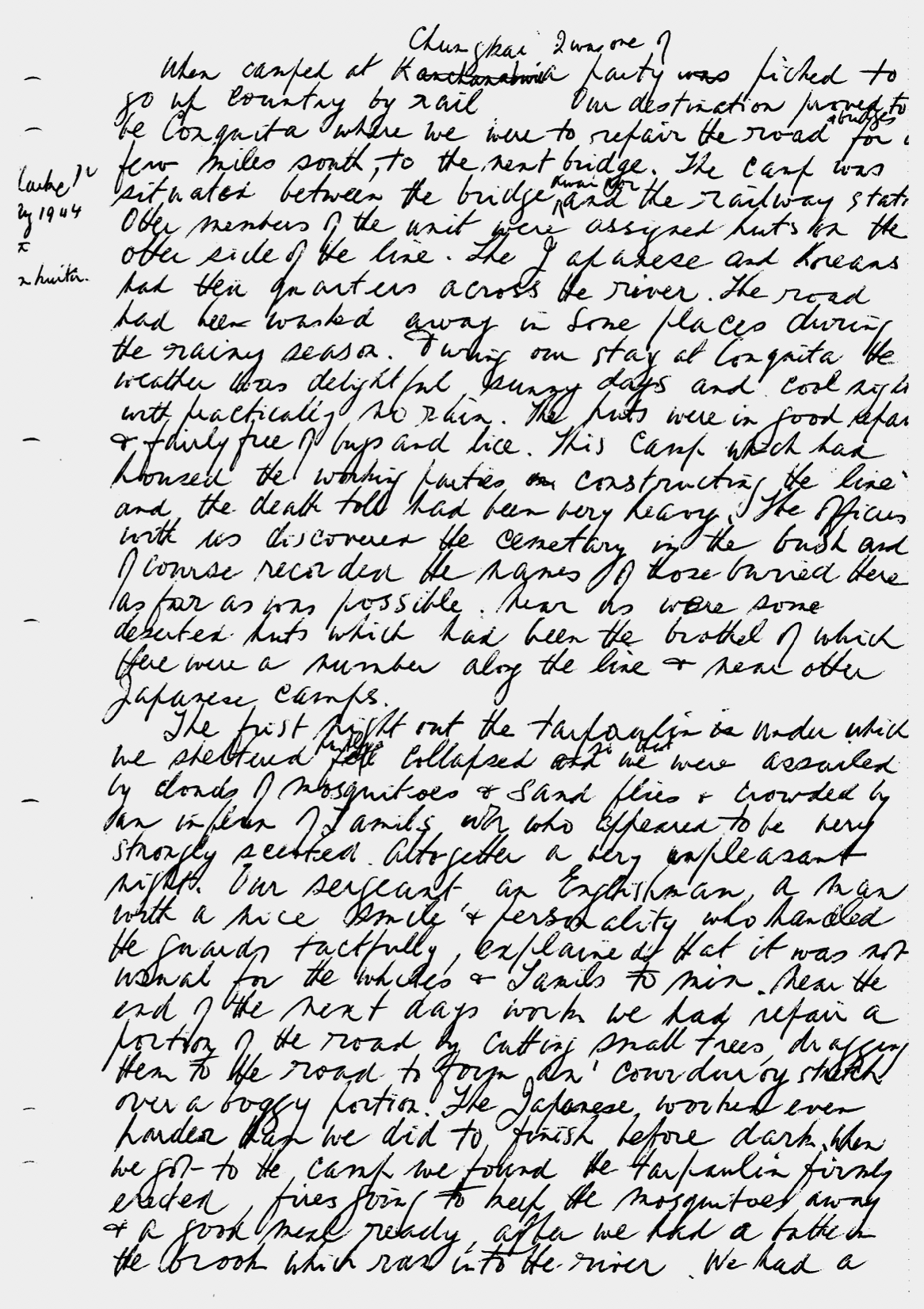
Below: End of War is evident – Kachu Mountain Camp. It was here Pop was able to years later, recall the weather was delightful – sunny during the day and cool at night with practically no rain. The surrounding rolling hills were covered with light forests, bamboo and wild bananas.
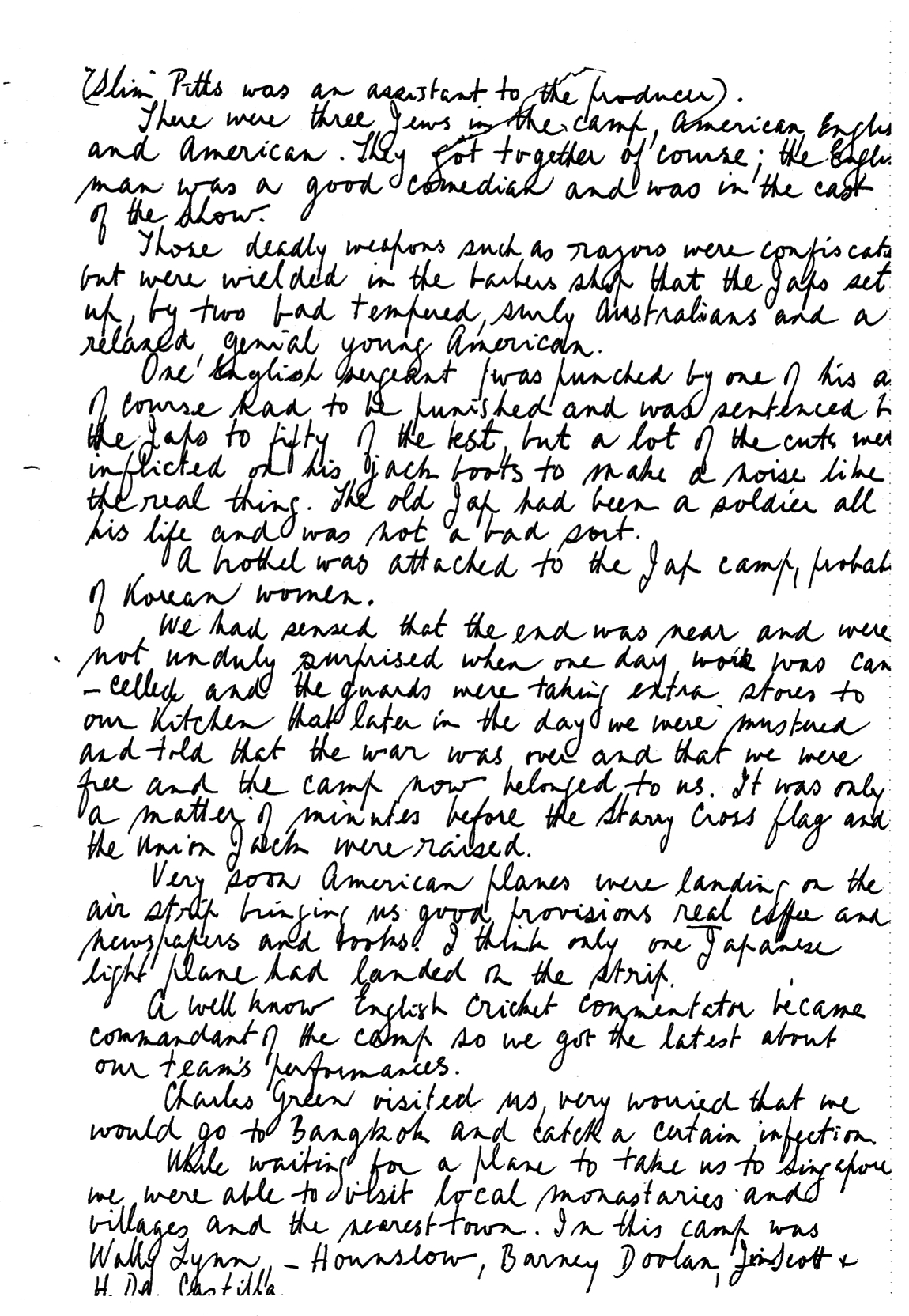
Above: Pop wrote of the well-known cricketer E.W. Jim Swanton who ‘assumed’ the leadership role of the Camp when Japan’s surrender was announced!
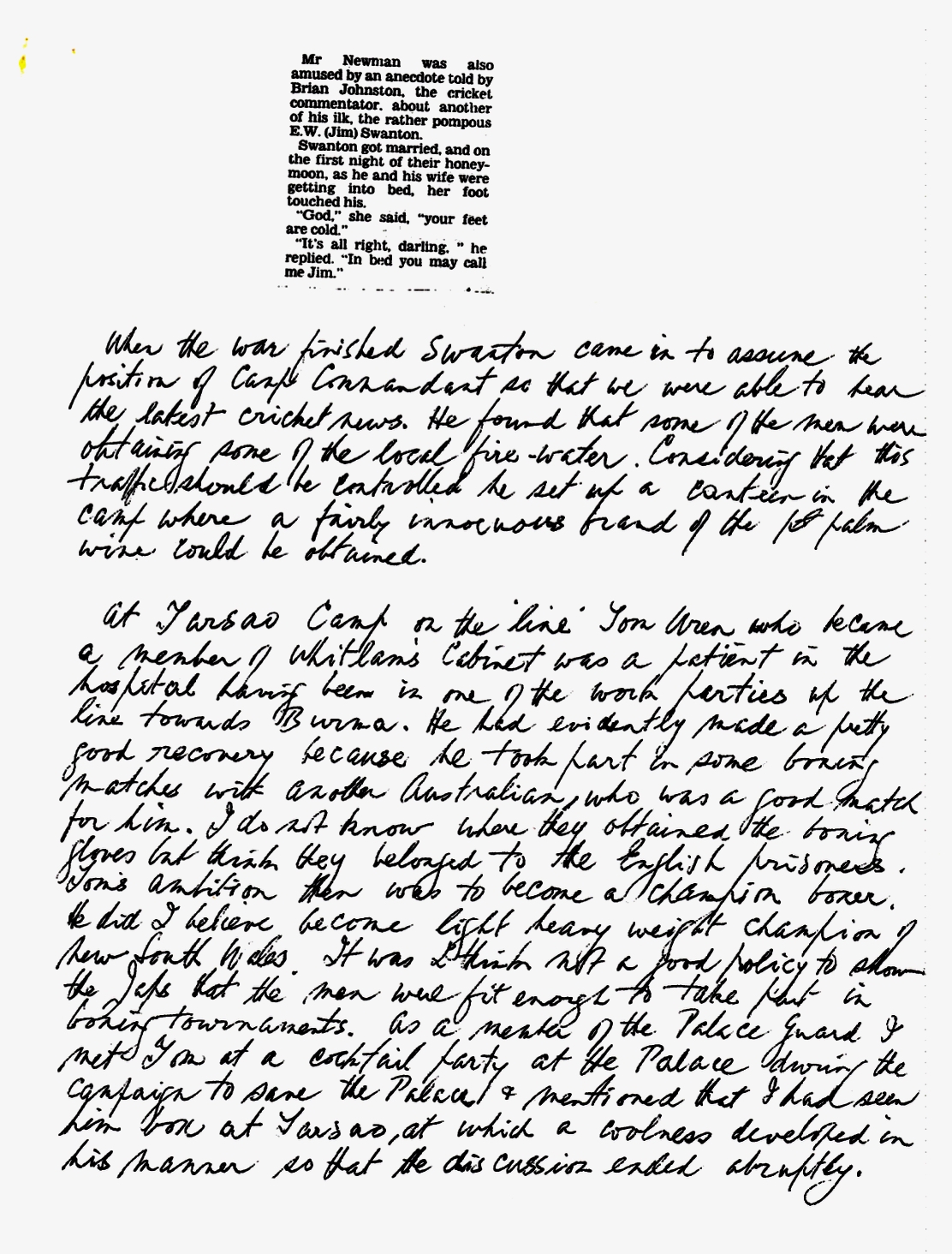

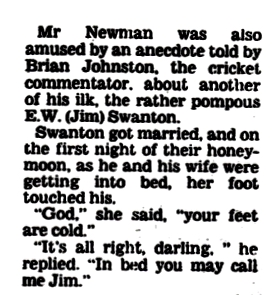
There were numerous stories praising Swanton,his cricket playing career and his cricket commentating and journalism life. He lived until he was 92 years old. However we did come across the following:
‘Born on February 11, 1907 at Forest Hill, London, Jim Swanton was a walking database of cricket knowledge. But he was not universally loved and the historian Rowland Bowen dubbed him as “Pomponius Ego”, while Ray Illingworth noted that Swanton was “too snobbish” to travel in the same car as his chauffeur.’
It is estimated Swanton who carried his Bible to war camps wrote about eight million words mostly relating to cricket over nine decades. Regardless of his demeanor, Lord Runcie noted at his funeral:
“The solemnity, prickliness and, yes, arrogance that were part of the serious perfectionist gave way to the gentle self-mockery and kindly wisdom which never seemed to fail us.”
At Tarsau Tom Uren, who later was part of the Whitlam Cabinet in Canberra, arrived sick from a work party located up the line, but in no time Uren was the winner of a boxing match with another Australian.
Many years later, Heppingstone saw Uren at a function. Pop mentioned the boxing match but Uren developed a sudden coolness in his manner and no further discussion took place.

Uren served in Parliament from 1984-1990.
You can listen to Tom Uren’s interview and memories of his POW life on Anzac Portal
Also Uren’s interview on DVA ‘The 75th Anniversary of the end of WW2’
“We worked by the principle of the strong looking after the weak.”
Tom Uren has his portrait in the National Portrait Gallery, Canberra. (The following has been copied from the Gallery information – interesting is the reference to Uren’s boxing)
Edward Tom Uren AC (1921-2015), former Deputy Leader of the Australian Labor Party, was a major campaigner on environmental and urban-planning issues and rights for veterans. He became active in left-wing politics after the war, during which he was a prisoner of the Japanese. Becoming member for the western Sydney electorate of Reid in 1958, he held the seat until he retired 32 years later.
He was Minister for Urban and Regional Development in the Whitlam government and Deputy Leader of the Opposition in 1976–1977. In the Hawke government he held several portfolios before retiring to the backbench in 1987. He retired from politics in 1990 and became a Life Member of the ALP in 1993. A great volume of Uren’s correspondence and official papers is held by the National Library; his autobiography, Straight left, was published in 1994.
Tom Uren lived for most of his life in Balmain, Sydney, where he was born. The portrait Gloves off refers not only to Uren’s early ambitions as a boxer, but to his multifarious political battles for social justice and heritage conservation of areas of inner Sydney (which can be seen in the background).
Uren lived to 92 years, serving 30 years with Australian politics.
______
Uren was born in Balmain, Sydney, (then a working-class suburb) and educated at Manly High School. Uren’s family originated from Penzance, Cornwall.
He left school at 13 to get what work he could as did thousands of boys and girls at that time.
As a young man, Uren played rugby league for Manly Warringah and was a strong competitive swimmer becoming Freshwater Surf Club’s junior champion. Uren had an early career as a professional boxer and challenged Bill Britt, the then holder of the Australian heavyweight championship.
He joined up when war broke out.
He was taken prisoner after a bloody battle against overwhelming Japanese forces near Koepang. His next three birthdays were as a PoW.
During his 18 months on the Burma-Thailand railway Uren suffered and saw dreadful brutality and debilitating, often fatal, diseases.
He was in the Hintok camp under the command of Melbourne surgeon Edward (Weary) Dunlop. Dunlop took the miserable allowance paid to his officers so he could buy food and medicine which were allocated according to need.
Uren said of the difference between the British and Australian POW Camps on the Railway in reference to British Officers and their indifferent relationship with their men. (This also occurred with some Australian Officers).
“Only a creek separated our two camps, but on one side the law of the jungle prevailed and on the other the principles of socialism.”
Eventually, Uren was shipped to Japan and put to work in a factory at Omuta about 80 km from Nagasaki.
__________



